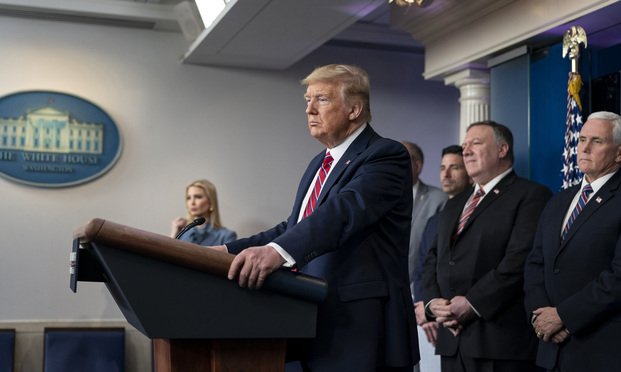How Far Can Donald Trump Actually Go in Responding to COVID-19?
States are often given deference when responding to a health crisis, but some governors are accusing the president of not doing enough.
March 30, 2020 at 06:47 PM
5 minute read
 President Donald J. Trump, joined by Vice President Mike Pence and members of the White House Coronavirus Task Force, delivers remarks during a coronavirus update briefing March 20, 2020, in the James S. Brady Press Briefing Room of the White House. Official White House Photo: Shealah Craighead
President Donald J. Trump, joined by Vice President Mike Pence and members of the White House Coronavirus Task Force, delivers remarks during a coronavirus update briefing March 20, 2020, in the James S. Brady Press Briefing Room of the White House. Official White House Photo: Shealah Craighead
Actions taken by President Donald Trump and state officials in response to the coronavirus pandemic are raising fresh questions about just how far executive powers can go during a public health crisis.
State and local officials are typically given deference in leading the response during a public health crisis, which can lead to a more timely, albeit scattered, response. At the same time, some governors are criticizing Trump for not moving faster at the federal level to offer guidance or additional support to their states.
In a legal fact check updated Monday, the American Bar Association said Trump may have the authority under the Commerce Clause to order a national quarantine or other mandate in response to the pandemic. Trump has not given any indication that he will do so, instead deferring to individual governors, states and local officials to issue such orders.
"American federalism is our greatest strength and our greatest weakness. But the weakness of federalism is really being shown very clearly here when we have a pandemic, a once-in-a-century event that requires a national response in a uniform way," said Lawrence Gostin, a public health law professor at Georgetown University. "We don't have that, we have a patchwork across the states."
"So that patchwork is going to be a big impediment to us, bringing the epidemic under control in the United States," he added.
Trump set off concerns for residents of New York and parts of New Jersey and Connecticut when he said March 28 that he was considering a quarantine for the region to contain the spread of COVID-19.
Hours later, Trump said he would not issue a quarantine, but the Centers for Disease Control and Prevention would issue a travel advisory for those in the tristate area. The next day, Trump announced that federal social distancing guidelines enacted over the respiratory virus will remain in place through April 30.
The U.S. Supreme Court in 1902 upheld local officials' authority to issue statewide quarantines, unless superseded by Congress. Gostin said Congress would have to approve an order blocking people from leaving or entering states, as it's the only body with the power to regulate interstate travel.
Gostin said some of the actions Trump has taken, like closing the borders, are well within his rights as president. But, he said, the president could have taken other steps outside of the legal sphere to unite the country's governors in combating the pandemic.
"He's not provided any guidance to governors about whether they should do aggressive social distancing, many of the red states that support Trump, they're not doing enough. So he's not really coordinating governors and mayors to row with a single oar," Gostin said. "Instead we see the president is criticizing governors, governors are criticizing the president, governors are taking very different actions themselves."
Michele Goodwin, a law professor at the University of California, Irvine, said questions about civil liberties are also being raised by the pandemic.
 Michele Goodwin.
Michele Goodwin.She said while authorities may have a right to issue orders to combat the spread of the virus, Americans have to be vigilant that the orders are actually related to the pandemic.
She pointed to the potential tracking of phone location data, to ensure Americans are staying home except for essential needs, as an area that could raise privacy concerns.
"Just because the government has authority to do a thing, it has to be for legitimate reasons, and it can't be expansive beyond the cause or call for that particular issue," Goodwin said.
She further predicted that legal challenges to government actions may also play out after orders issued in response to the pandemic are lifted, as many federal courts have closed down except for emergency and essential proceedings. However, Goodwin noted there may be instances where Americans are seeking injunctive relief in response to the pandemic, and that courts may move swiftly in those cases.
She also said that some executive actions people have called for Trump to take, like utilizing the Defense Production Act, could also raise questions of civil liberties. The president invoked the act March 27 to order General Motors to start making ventilators, a process the manufacturing giant said it had already begun.
"There are some times in which we want the government to use certain powers and authorities and to use them swiftly," Goodwin said. "But again, it must all be measured."
Gostin also raised concerns about how individual judges could approach any challenges filed over actions taken in response to the coronavirus restrictions, noting rulings should be based on scientific evidence.
"Courts don't know how to separate good from not-so-good science," Gostin said.
He said in cases stemming from the pandemics, judges should turn to federal and state health guidelines to help make their rulings.
Read more:
How to Heed Privacy Law in the Midst of a Pandemic
Virus Pandemic Delays Judge's Review of Unredacted Mueller Report
What Can Employers Ask and Disclose About COVID-19? EEOC Has Answers.
This content has been archived. It is available through our partners, LexisNexis® and Bloomberg Law.
To view this content, please continue to their sites.
Not a Lexis Subscriber?
Subscribe Now
Not a Bloomberg Law Subscriber?
Subscribe Now
NOT FOR REPRINT
© 2025 ALM Global, LLC, All Rights Reserved. Request academic re-use from www.copyright.com. All other uses, submit a request to [email protected]. For more information visit Asset & Logo Licensing.
You Might Like
View All
Brownstein Adds Former Interior Secretary, Offering 'Strategic Counsel' During New Trump Term
2 minute read
Weil, Loading Up on More Regulatory Talent, Adds SEC Asset Management Co-Chief
3 minute read
FTC Sues PepsiCo for Alleged Price Break to Big-Box Retailer, Incurs Holyoak's Wrath
5 minute read
Supreme Court Will Hear Religious Parents' Bid to Opt Out of LGBTQ-Themed School Books
Trending Stories
- 1Avantia Publicly Announces Agentic AI Platform Ava
- 2Shifting Sands: May a Court Properly Order the Sale of the Marital Residence During a Divorce’s Pendency?
- 3Joint Custody Awards in New York – The Current Rule
- 4Paul Hastings, Recruiting From Davis Polk, Adds Capital Markets Attorney
- 5Chancery: Common Stock Worthless in 'Jacobson v. Akademos' and Transaction Was Entirely Fair
Who Got The Work
J. Brugh Lower of Gibbons has entered an appearance for industrial equipment supplier Devco Corporation in a pending trademark infringement lawsuit. The suit, accusing the defendant of selling knock-off Graco products, was filed Dec. 18 in New Jersey District Court by Rivkin Radler on behalf of Graco Inc. and Graco Minnesota. The case, assigned to U.S. District Judge Zahid N. Quraishi, is 3:24-cv-11294, Graco Inc. et al v. Devco Corporation.
Who Got The Work
Rebecca Maller-Stein and Kent A. Yalowitz of Arnold & Porter Kaye Scholer have entered their appearances for Hanaco Venture Capital and its executives, Lior Prosor and David Frankel, in a pending securities lawsuit. The action, filed on Dec. 24 in New York Southern District Court by Zell, Aron & Co. on behalf of Goldeneye Advisors, accuses the defendants of negligently and fraudulently managing the plaintiff's $1 million investment. The case, assigned to U.S. District Judge Vernon S. Broderick, is 1:24-cv-09918, Goldeneye Advisors, LLC v. Hanaco Venture Capital, Ltd. et al.
Who Got The Work
Attorneys from A&O Shearman has stepped in as defense counsel for Toronto-Dominion Bank and other defendants in a pending securities class action. The suit, filed Dec. 11 in New York Southern District Court by Bleichmar Fonti & Auld, accuses the defendants of concealing the bank's 'pervasive' deficiencies in regards to its compliance with the Bank Secrecy Act and the quality of its anti-money laundering controls. The case, assigned to U.S. District Judge Arun Subramanian, is 1:24-cv-09445, Gonzalez v. The Toronto-Dominion Bank et al.
Who Got The Work
Crown Castle International, a Pennsylvania company providing shared communications infrastructure, has turned to Luke D. Wolf of Gordon Rees Scully Mansukhani to fend off a pending breach-of-contract lawsuit. The court action, filed Nov. 25 in Michigan Eastern District Court by Hooper Hathaway PC on behalf of The Town Residences LLC, accuses Crown Castle of failing to transfer approximately $30,000 in utility payments from T-Mobile in breach of a roof-top lease and assignment agreement. The case, assigned to U.S. District Judge Susan K. Declercq, is 2:24-cv-13131, The Town Residences LLC v. T-Mobile US, Inc. et al.
Who Got The Work
Wilfred P. Coronato and Daniel M. Schwartz of McCarter & English have stepped in as defense counsel to Electrolux Home Products Inc. in a pending product liability lawsuit. The court action, filed Nov. 26 in New York Eastern District Court by Poulos Lopiccolo PC and Nagel Rice LLP on behalf of David Stern, alleges that the defendant's refrigerators’ drawers and shelving repeatedly break and fall apart within months after purchase. The case, assigned to U.S. District Judge Joan M. Azrack, is 2:24-cv-08204, Stern v. Electrolux Home Products, Inc.
Featured Firms
Law Offices of Gary Martin Hays & Associates, P.C.
(470) 294-1674
Law Offices of Mark E. Salomone
(857) 444-6468
Smith & Hassler
(713) 739-1250










